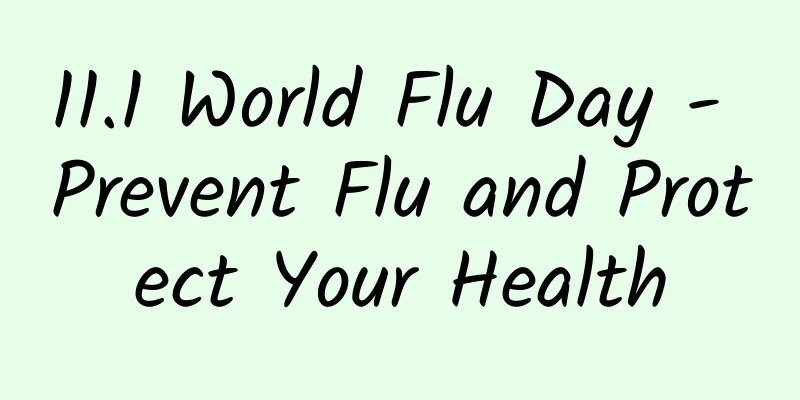11.1 World Flu Day - Prevent Flu and Protect Your Health

|
11.1 World Flu Day - Prevent Flu and Protect Your Health Duchang County Center for Disease Control and Prevention 2023-11-02 15:40 Published in Jiangxi 11.1 World Flu Day Preventing Flu Protect your health What is influenza? Influenza (abbreviated as "flu") is an acute respiratory infectious disease caused by influenza viruses. Influenza viruses can be divided into four types: A, B, C, and D. The main types of influenza viruses that cause seasonal epidemics are influenza A and B viruses. Influenza viruses are mainly transmitted through respiratory droplets produced by sneezing and coughing of infected people, and can also be infected through direct or indirect contact with mucous membranes such as the mouth, nose, and eyes. In certain places, such as crowded, closed, or poorly ventilated rooms, it may also be transmitted in the form of aerosols. People are generally susceptible to influenza viruses, and influenza patients and asymptomatic carriers are the main sources of influenza infection. What are the dangers of influenza? Influenza viruses are antigenically variable and spread rapidly, causing seasonal epidemics every year. Influenza outbreaks are prone to occur in places where people gather, such as schools, childcare institutions, and nursing homes. Influenza has an acute onset and is mostly self-limiting, with symptoms such as fever, headache, muscle aches, nasal congestion, runny nose, cough, sore throat, and general discomfort. However, in high-risk groups such as pregnant women, infants, the elderly, and patients with chronic diseases, complications such as pneumonia or aggravation of underlying diseases may develop into severe cases, and severe cases may lead to death. The annual seasonal epidemic of influenza can cause 3 million to 5 million severe cases and 290,000 to 650,000 respiratory disease-related deaths worldwide, posing a serious threat to human health. How to prevent influenza? 1. Get a flu shot Influenza vaccination is the most economical and effective measure to prevent influenza, and can significantly reduce the risk of contracting influenza and developing serious complications. 2. Maintain good hygiene habits Wash your hands frequently, observe etiquette, cover your mouth and nose with a tissue or towel when coughing or sneezing, and try to avoid touching your eyes, nose or mouth. 3. Develop healthy living habits Maintain a regular schedule, balanced nutrition, adequate rest, moderate exercise, and maintain your immunity. 4. More ventilation, less gathering Open windows frequently to ventilate and improve air circulation. During the influenza epidemic season, high-risk groups should try to avoid going to closed places where people gather, and it is recommended to wear masks when going there. 5. Take good personal protection to reduce the spread of diseases If you have flu-like symptoms, you should rest at home, observe your health, avoid going to work or class when you are sick, and wear a mask when you go out or come into contact with others to reduce the spread of the disease. If your condition worsens, you need to go to the hospital for treatment in time. |
>>: The Five Precepts of Exercise and Health Preservation
Recommend
Diagram of organs below the left side of the female navel
With the continuous development of society, altho...
Women should never miss these three parts when taking a bath
Taking a bath is a simple thing for everyone, but...
Women's armpit odor
Many people around us have armpit odor. If your a...
The causes of non-menstrual bleeding are known at a glance
Most women have a week every month when they have...
What's the matter with the fleshy lump on my labia?
The growth of fleshy bumps on the labia is a prob...
What causes anal pain during pregnancy?
Although there will be various changes in the pre...
Is it normal to have menstruation 5 months after giving birth?
Nowadays, many women choose to raise their babies...
The benefits of eating fish regularly for women
Fish is rich in nutrients, contains a lot of prot...
What does ovulation mean?
Women become reproductively capable after puberty...
Why am I still pregnant when I have my period?
After a woman becomes pregnant, her menstrual per...
Lower abdominal pain but no menstruation
Some girls will have delayed menstruation and pre...
Can I have sex during down-regulation?
Before doing IVF, both parties need to undergo va...
How long after the curettage can I have sex?
Diagnostic curettage is also called curettage. It...
What is the cause of breast glandular structure disorder?
If a woman's physical examination report show...


![[Medical Q&A] Will the heart quietly become "fat" if you have long-term high blood pressure?](/upload/images/67f0f1deeed61.webp)






